

Magical thinking : PoliticalHumor. NPR Cookie Consent and Choices. "Dark Money" Funds Climate Change Denial Effort. The largest, most-consistent money fueling the climate denial movement are a number of well-funded conservative foundations built with so-called "dark money," or concealed donations, according to an analysis released Friday afternoon.
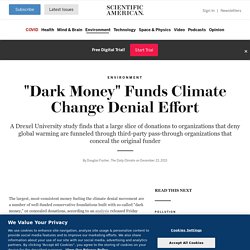
The study, by Drexel University environmental sociologist Robert Brulle, is the first academic effort to probe the organizational underpinnings and funding behind the climate denial movement. It found that the amount of money flowing through third-party, pass-through foundations like DonorsTrust and Donors Capital, whose funding cannot be traced, has risen dramatically over the past five years. In all, 140 foundations funneled $558 million to almost 100 climate denial organizations from 2003 to 2010.
How to defend science to climate-change deniers and others who attack it (opinion) It should come as no surprise these days that science is under attack.
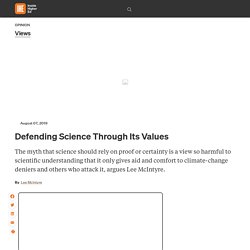
Climate-change deniers, anti-vaxxers and a host of others feel free to doubt or dismiss hard-won scientific knowledge based on a standard of belief that is ignorant if not outright irrational. To claim that climate change "isn't settled science" or that the safety of vaccines "must be proven" reveals a level of misunderstanding about how science works that is so basic it must be addressed before we have any hope of getting someone to accept the findings of science. So how to fight against this? One way not to defend science is to pretend it is perfect. The myth that science should rely on proof or certainty -- or that there is some sort of "scientific method" that even flawed human beings can follow to produce guaranteed results -- is a view so harmful to scientific understanding that it only gives aid and comfort to its enemies.
Examining the Oil Industry’s Efforts to Suppress the Truth about Climate Change. ExxonMobil is still bankrolling climate science deniers. ExxonMobil says it believes “the risk of climate change is real,” and it is “committed to being part of the solution.”
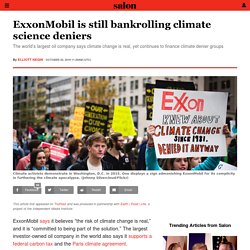
The largest investor-owned oil company in the world also says it supports a federal carbon tax and the Paris climate agreement. Then why, after all these years, is the company still financing advocacy groups, think tanks, and business associations that reject the reality and seriousness of the climate crisis, as well as members of Congress who deny the science and oppose efforts to rein in carbon emissions? According to the company’s latest grantmaking report, it gave $772,500to 10 such groups in 2018, which does not include its annual dues to trade groups such as the American Petroleum Institute, which opposes a carbon tax. How the oil industry has spent billions to control the climate change conversation. America’s oil companies are trying to rebrand themselves as part of the solution to the climate crisis, launching a campaign to counter top Democrats’ proposals to rapidly cut pollution from the power plants and cars that run on the industry’s petroleum and natural gas.

They say natural gas – a fossil fuel that emits heat-trapping carbon dioxide – is helping to slow climate disruption by providing an alternative to coal. “We’re taking our message of energy progress to every corner of the country to show just what’s at stake in Washington and in state capitols around the country,” said Mike Sommers, CEO of the oil trade group the American Petroleum Institute (API), on a press call announcing the plan. Five climate change science misconceptions debunked. The science of climate change is more than 150 years old and it is probably the most tested area of modern science.
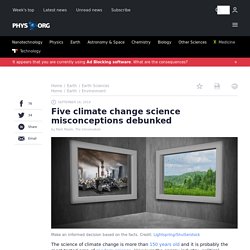
However the energy industry, political lobbyists and others have spent the last 30 years sowing doubt about the science where none really exists. The latest estimate is that the world's five largest publicly-owned oil and gas companies spend about US$200m each year on lobbying to control, delay or block binding climate-motivated policy. This organized and orchestrated climate change science denial has contributed to the lack of progress in reducing global green house gas (GHG) emissions—to the point that we are facing a global climate emergency. Report details how ExxonMobil sowed doubt on climate change. Two days before Exxon Mobil goes to court Wednesday, facing New York state accusations the oil company misled investors about climate change, a team of researchers released a report Monday outlining the company and the broader fossil fuel industry’s decades-long campaign of deception, and its success at confusing the American public.
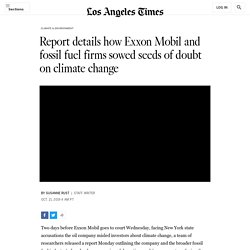
The report, which was published by scientists at Harvard, George Mason and Bristol universities, draws parallels between the campaigns launched by tobacco companies and oil industries to mislead the public about their products, both with a goal of delaying government policies and regulations that could cut into their profits. Revelations about Exxon Mobil’s campaign came from 2015 news reports in the Los Angeles Times and Inside Climate News, and studies previous to the one Monday have documented its efforts to manipulate public opinion.
To Understand How Science Denial Works, Look to History. 2020 has been a historic year— and mostly not in a good way.
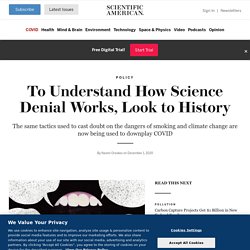
Among many things, we saw a historic level of disregard of scientific advice with respect to the COVID-19 virus, a disregard that made the pandemic worse in the U.S. than in many other countries. But while the events of 2020 may feel unprecedented, the social pattern of rejecting scientific evidence did not suddenly appear this year. There was never any good scientific reason for rejecting the expert advice on COVID, just as there has never been any good scientific reason for doubting that humans evolved, that vaccines save lives, and that greenhouse gases are driving disruptive climate change.
From tobacco to coronavirus – the grim history of science denial and conspiracy theory – Redaction Politics. By Mason Quah THERE are many areas of modern political policy that are said to be science driven, from climate change policies to coronavirus responses.
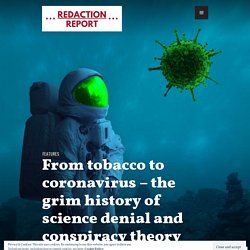
Tobacco denialism: part two - Great Moments In Science - ABC Radio National. Dr Karl: Last time, I talked about the history of smoking, and how the tobacco companies had managed to make smoking a common and mainstream activity.
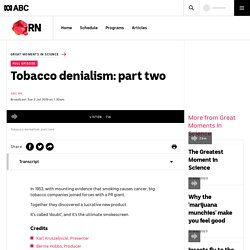
But in the 1920s, the previously unknown disease of lung cancer began to appear, and to increase with each passing year. So the tobacco companies came up with new strategies. Back in the late 1920s in the USA, the Lucky Strike brand of cigarettes was the first to incorporate medical doctors in their ads, such as "20,679 Physicians say 'LUCKIES are less irritating'".
By the mid-1930s, Philip Morris, then a newcomer to the tobacco industry, was claiming that after smoking their cigarettes, "every case of irritation cleared completely, and definitely improved". By the 1930s, tobacco advertisements first began appearing in prestigious medical journals. Science denial on the right hampers US response to COVID-19.
Science denial in the United States has for decades fueled resistance to taking action on climate change.
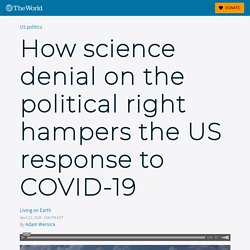
Science Denialism in the 21st Century. I went to a conference at the New York Academy of Sciences (NYAS) on June 28 titled Science Denialism, Public Policy, and Global Health. It was presented jointly by the Rutgers Global Health Institute and the academy. The goal of the conference was to discuss the social, cultural, behavioral and economic roots of science denialism, and to ask how to make the best case for science. The panelists included Allan Brandt, professor of the history of science at Harvard University; Dominique Brossard, chair of the Department of Life Sciences Communication at the University of Wisconsin-Madison; Kelly Brownell, professor at the Sanford School of Public Policy, Duke University, and Kelly Greenhill, associate professor and director, International Relations Program at Tufts University.
Journalist Ira Flatow, NPR correspondent and host of Science Friday, was the moderator. I have had a long interest in science denialism. Fact check: This CDC document does not say that that SARS-CoV-2 doesn’t exist. Where Is the Coronavirus? The CDC Says It Isn’t Available. The CDC document is titled, “CDC 2019-Novel Coronavirus (2019-nCoV) Real-Time RT-PCR Diagnostic Panel.” It is dated July 13, 2020. The Trump administration is burying dozens of studies detailing the promise of renewable energy. This story was produced in collaboration with InvestigateWest, a nonprofit newsroom in Seattle with a focus on the environment, public health, and government accountability It was a scorching August day at the Hoover Dam as three Trump administration officials gathered for a little celebration honoring pollution-free hydroelectricity.
Inside the dam’s Spillway House Visitor Center, air conditioning thankfully kept people comfortable as the president’s appointees heaped praise on hydropower. A U.S. Department of Interior news release about the event calls hydroelectric dams such as Hoover —where the Colorado River slips between Arizona and Nevada — a “unique resource critical to America’s future, which supports the integration of other renewables like wind and solar onto the grid.”
But what went unsaid at the grip-and-grin was that one of those high-ranking officials, Dan Simmons of the U.S. In all, the department has blocked reports for more than 40 clean energy studies. Kids Believe Literally Anything They Read Online, Even Tree Octopuses. Anyone can publish anything on the Internet. Despite that, children aren't taught how to evaluate the reliability of information they read there. As demonstrated by a recent study, this is true to a shocking extent, and there may be dire implications for the future of today's young people. For their study, Donald Leu, professor of education at the University of Connecticut, and his colleagues selected 53 of the best readers from seventh grade classes in low-income school districts in South Carolina and Connecticut. “Save the Pacific Northwest tree octopus”: a hoax revisited. Or: How vulnerable are school children to fake news?
Confabulation. In psychology, confabulation (verb: confabulate) is a memory disturbance, defined as the production of fabricated, distorted or misinterpreted memories about oneself or the world, without the conscious intention to deceive.[1] Confabulation is distinguished from lying as there is no intent to deceive and the person is unaware the information is false.[2] Although individuals can present blatantly false information, confabulation can also seem to be coherent, internally consistent, and relatively normal.[2] Individuals who confabulate present incorrect memories ranging from "subtle alternations to bizarre fabrications",[3] and are generally very confident about their recollections, despite contradictory evidence.[4] Most known cases of confabulation are symptomatic of brain damage or dementias, such as aneurysm, Alzheimer's disease, or Wernicke–Korsakoff syndrome (a common manifestation of thiamine deficiency caused by alcoholism).[5]
How Hitler Pioneered ‘Fake News’ In September 1919, in response to a letter from one of his soldier students, Hitler defined his attitude toward the Jewish question. Everything that might seem to be a higher goal (“religion, socialism, democracy”) was for Jews a way to make money. Jews were not to be treated as fellow people, but to be understood as an objective problem, like a disease (“racial tuberculosis”) that needed to be resolved. Full text of "Festinger-Riecken-Schachter-When-Prophecy-Fails-1956.pdf (PDFy mirror)" How motivated skepticism strengthens incorrect beliefs. This is part two in my "The Backfire Effect" series. This one focuses on motivated reasoning, specifically something called motivated skepticism. In addition, it features interviews with the scientists who coined the backfire effect term itself and who have extended their original research outside of politics and into health issues.
How to Convince Someone When Facts Fail. Have you ever noticed that when you present people with facts that are contrary to their deepest held beliefs they always change their minds? Why people don’t change their minds — even when faced with the facts. I’ve posted before about how cognitive dissonance (a psychological theory that got its start right here in Minnesota) causes people to dig in their heels and hold on to their beliefs even when faced with overwhelming evidence to the contrary.
Indeed, when people’s self-confidence is rattled (when facts intrude?) This Article Won’t Change Your Mind. “I remember looking at her and thinking, ‘She’s totally lying.’ Why we believe alternative facts. Fact or opinion? It's a distinction we learn as kids. But it turns out judging facts isn't nearly as black-and-white as your third-grade teacher might have had you believe. Confirmation Bias And the Power of Disconfirming Evidence. Confirmation bias is our tendency to cherry-pick information that confirms our existing beliefs or ideas.
The Backfire Effect. The Elusive Backfire Effect: Does correcting misinformation strengthen people’s beliefs in false claims? This blog post, written by Dr. Terry Flynn and Tim Li, is based on a research paper by Thomas Wood, Ph.D., Assistant Professor at Ohio State University; and Ethan Porter, Ph.D., Assistant Professor of Media and Public Affairs at George Washington University. Key Findings A “backfire” effect may be rarer than researchers previously thought.